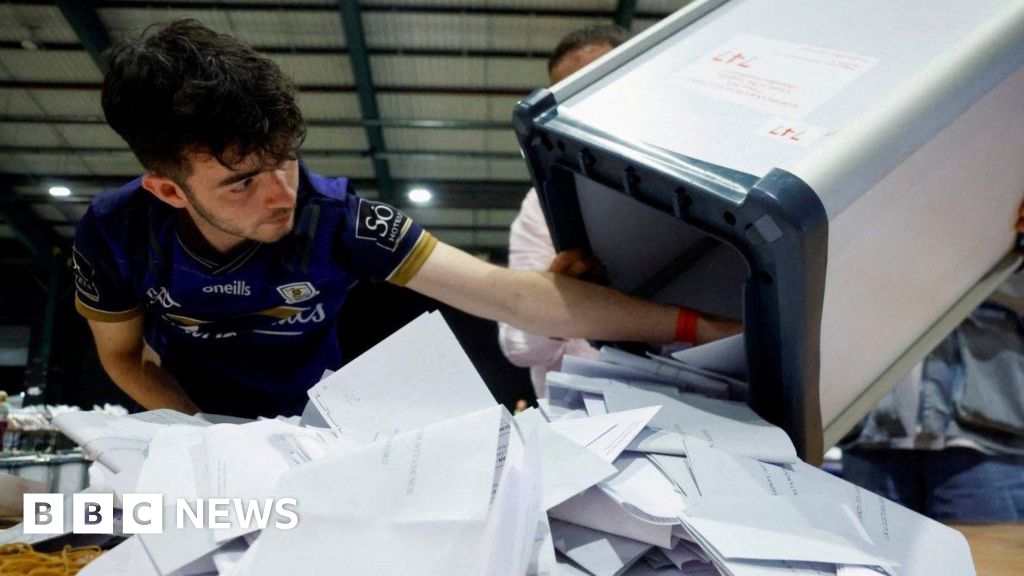World
Irish elections: Fine Gael and Fianna Fáil fight for lead – BBC News

- Author, Aoife Moore
- Role, BBC News NI Dublin reporter
-
More than 400 candidates have been elected in the Republic of Ireland’s local elections so far, as counting continues in most constituencies.
Results so far indicate that government coalition partners Fine Gael and Fianna Fáil will be the largest parties in local government, with independents also faring well.
Voters headed to the polls in three elections on Friday.
They were the local elections, European elections and Ireland’s first directly-elected mayor election in Limerick.
The polls will provide political parties with an insight into voter sentiment ahead of the next general election, which must be held by March 2025.
Counting began for the European elections on Sunday and for the local council elections on Saturday.
Sinn Féin, the main opposition party, is expected to have more councillors elected to local authorities than at the previous local election, but not as many as it wanted or expected.
Speaking to reporters today, Ms McDonald said: “It has not been our day, but we will have our day.”
She said that the party had made some gains, albeit modest ones.
“We don’t always get it right, we clearly have lessons to learn. We’ve listened carefully, we will regroup, we will come out, we will do better, and I, as the leader of Sinn Féin, will lead that,” Ms McDonald said.
She admitted that the party was “ambitious” in the number of candidates it put forward.
‘A lot of disappointment’
Pearse Doherty, Sinn Féin TD (member of parliament) for Donegal, told RTÉ that the party would have to “dust themselves down” and look at “lessons that can be learned”.
“It is not the result we hoped for,” he said.
“There will be a lot of disappointment for some of our new candidates who were trying to break new ground.”
With a general election ahead, Mr Doherty said he still believes people want change.
“People need to ask themselves if they want Fine Gael and Fianna Fáil for the next five years,” he said.
Good news for government
The current Irish government has been in place since June 2020, when Fine Gael, Fianna Fáil and the Green Party voted to enter a coalition together.
Early indications suggest the governing parties will not suffer losses on a scale that many had predicted.
Taoiseach Simon Harris said he was “absolutely delighted” with his party Fine Gael’s performance “right across the country, in rural Ireland and urban Ireland”.
“I think what Sinn Féin need to realise here is the Irish people see through the noise, the Irish people don’t believe they live in a failed state, the Irish people don’t believe in all of the negativity,” he said.
“What the Irish people want is pragmatic delivery. The Irish people do want change, they want credible change, that’s the sort of change I’m offering,” he said.
Speaking of why many people voted for independent candidates, Mr Harris said there are a lot of “hard working, decent” independents.
He added that he does not think the story of this election is a surge to independents – rather an “absolute collapse in support” for Sinn Féin.
Tánaiste (deputy prime minister) and Fianna Fáil leader Michéal Martin said his party had performed “far better” than predicted.
‘Game on’ for general election
Speaking to RTÉ this afternoon, former taoiseach Leo Varadkar said it was now “game on” for a general election.
“For a party that’s been in government for nearly 14 years to win the local elections, and it does look like we’re going to win the local elections, that’s an extraordinary result,” he added.
Analysis – BBC News NI’s Dublin reporter Aoife Moore
The bounce for Fine Gael may be linked to new leader Simon Harris who has moderately increased the party’s standing in the polls since Leo Varadkar’s resignation in March.
Party sources say they are buoyed by the successful and accurate candidate selection arithmetic.
The story of the weekend may prove to be the independents, who have done well nationally, however, due to the diverse nature of the candidates, very little can be garnered about the outlook of those voting for independents.
The first elections for new leaders for Labour’s Ivana Bacik and the Social Democrats Holly Cairns look moderately successful, however, no big wins have been delivered for those parties either.
Why are Ireland’s EU results being counted late?
Although Irish voters turned out on Friday, results for the European elections cannot be released until every country has finished voting later on Sunday.
Fourteen MEPs will be elected across three constituencies to represent Ireland at the next European Parliament.
Five will represent the constituency of Midlands North-West, a 15-county constituency in which 27 candidates ran.
Five will represent Ireland South, where 23 candidates ran across 10 counties.
And four will represent Dublin, where there were also 23 candidates on the ballot.
Around 373 million people across the European Union are eligible to vote in this election.
Together, voters in its 27 member states will elect 720 MEPs. It is the second biggest democratic election in the world after India.
However, under European law, results cannot be announced until all countries have finished voting.
Voting takes place across four days, and began with the Netherlands on 6 June and Ireland on 7 June.
Some countries voted on 8 June and 20 others on 9 June.
Each country is given seats proportionate to their population.
In the next parliament, Germany will have the most amount of seats with 96, whereas Cyprus, Luxembourg and Malta will have six.
Results will be announced after 22:00 BST on Sunday evening.
When will the Irish local election results come out?
The full results will take days to be finalised because Ireland uses a system of proportional representation which allows voters to rank candidates by order of preferences.
Ballot papers are sorted and counted multiple times by hand.










